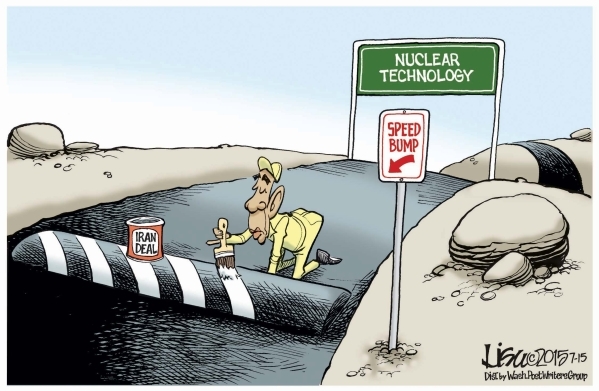Surrender on Iran nuclear deal makes U.S. less secure
In selling the nuclear deal reached with the Iranian regime in Vienna last week, President Barack Obama repeatedly made the point that this accommodation with one of the world‘s most repressive and aggressive regimes is based not on trust, but on verification.
"It‘s not enough for us to trust when you (Iran) say that you are only creating a peaceful nuclear program. You have to prove it to us," the president told Thomas Friedman of The New York Times. "And so this whole system that we built is not based on trust; it‘s based on a verifiable mechanism, whereby every pathway (to a nuclear weapon) that they have is shut off."
The president‘s claim doesn‘t stand up to scrutiny. Therefore, the task before us now is to persuade federal legislators that the right deal with Iran is a deal that leaves America and its allies more, and not less, secure. That means challenging the Iranians not just on their nuclear ambitions, but on their broader drive for regional domination.
The six-nation coalition led by U.S. Secretary of State John Kerry has made extraordinary concessions to the Iranians since the signing of an initial agreement in Geneva in November 2013. More than 5,000 centrifuges will remain operational at the uranium enrichment facility at Natanz -- a number Iran has said can be expanded to 19,000. Fordow, a heavily fortified underground enrichment bunker we know about only because it was unmasked by Western intelligence services in 2009, also remains operational, with more than 1,000 centrifuges spinning there. Ditto for the Arak plutonium reactor -- deemed "unacceptable" by Kerry in December 2013 -- which will remain functional.
With a proper inspections regime, it could be argued that proper oversight of these facilities would be manageable. But that isn‘t the case; Laurent Fabius, the French foreign minister, was clear that the International Atomic Energy Agency will have access to Iran‘s "military" sites -- like those listed above, as well as the facility at Parchin, which has been off-limits to IAEA inspectors for the past 10 years - "under certain conditions." The Iranians have until Dec. 15 to reach an agreement with the IAEA over what those access conditions would involve. Given the regime‘s history of deception, the likelihood for meaningful access, based on the principle of "anytime, anywhere" inspections, is frighteningly nonexistent.
Indeed, the question of access to nuclear sites is already buried in red tape. Although President Obama asserts that "the IAEA will have access where necessary, when necessary," Iran will have up to 24 days to stonewall the IAEA and conceal its activities. And if agreement on access to a site can‘t be reached, there is no mechanism to resolve it, which means the vital work of preventing Iran from weaponizing what the regime dishonestly insists is a civilian nuclear program cannot be carried out.
Over the previous decade, successive United Nations Security Council resolutions demanded a definitive halt to Iran‘s uranium enrichment activities. That approach has now been completely abandoned.
In the final analysis, then, President Obama couldn‘t bring home a good deal, nor could he bring himself to walk away. The consequence is a deal that will give Iran billions of dollars in cash and relief to fuel its terror and war machines, shred the hard-won sanctions and enable the Iranians to get away with hiding the full extent of their nuclear work, infrastructure and know-how.
Don‘t be fooled, either, by the claim that the Iranians will pump $150 billion of promised sanctions relief into their ailing economy. Much, even most, of that windfall will be spent on Iranian terror operations in Gaza, Lebanon, Iraq and Yemen, as well as on prolonging the brutal Assad dictatorship in Syria, which has become a full-fledged tool of Iran. At the end of June, Iranian Supreme Leader Ayatollah Ali Khamenei announced that the forthcoming year‘s defense budget would be increased by a colossal 32.5 percent. The regime is committed to war and conflict, not peace and stability.
And here is where we come to Obama‘s greatest error. The president has compared himself to Ronald Reagan, who reached a historic series of arms control agreements with the Soviet Union. Within a few years of those agreements being reached, the Soviet Union collapsed. Ten or so years from now, when the sunset clause on the Iran nuclear deal expires, the world will be faced with an Iran that is stronger, more belligerent and more dangerous than it is now.
That‘s why I appeal to my former colleagues in the House Democratic Caucus to show courage and common sense by rejecting the deal in its current form, because the stakes involved here transcend the normal partisan divides of our politics. Otherwise, 10 years from now, we could find ourselves embroiled in an apocalyptic war with a nuclear Iran precisely the outcome the president says he wants to avoid.
Shelley Berkley, a former U.S. representative from Nevada, sits on the board of directors of The Israel Project.

















